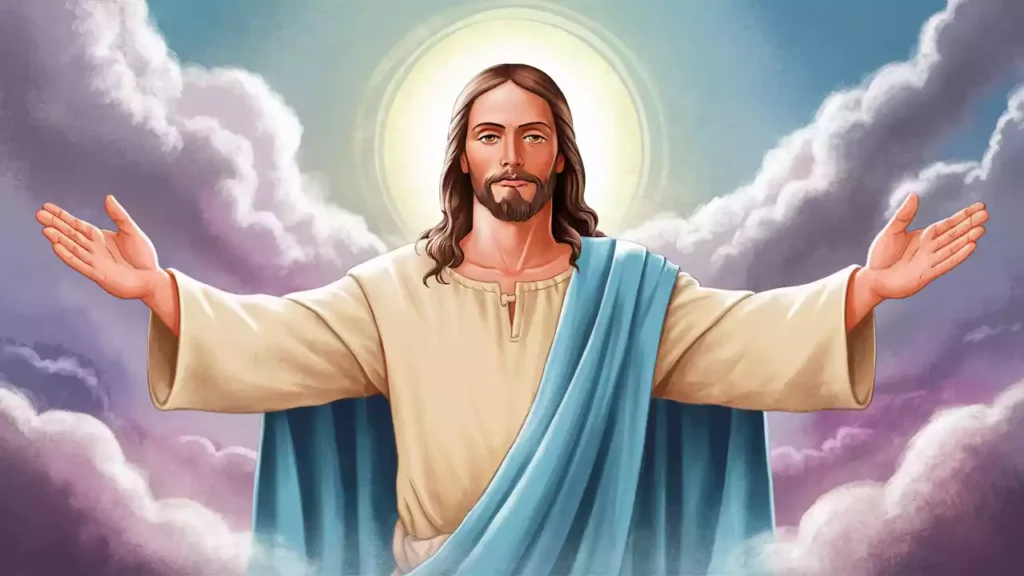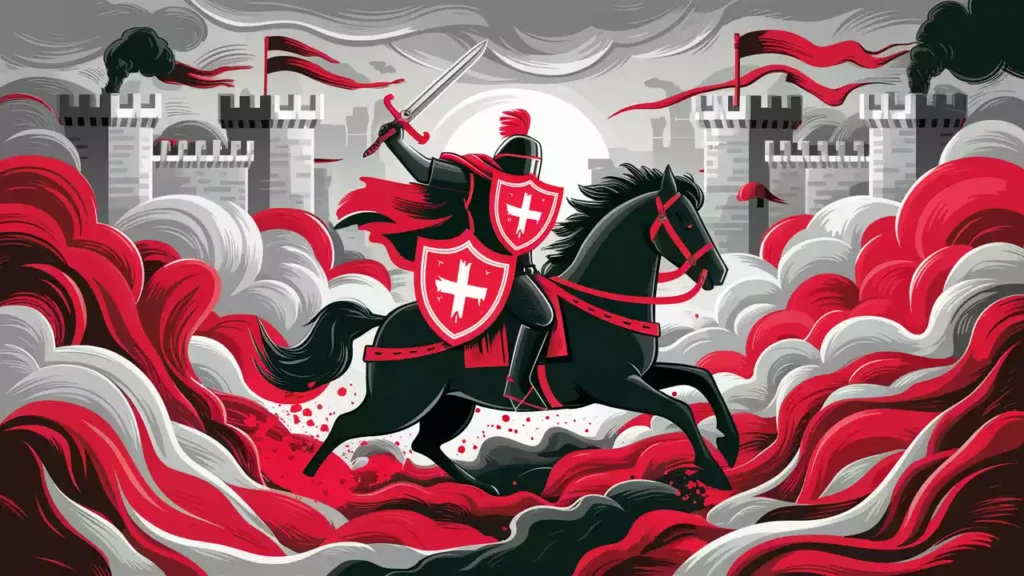Summary
- 1 Key Points
- 2 Origins of Christianity
- 3 Jesus Christ: The central figure
- 4 The Bible: Holy Scripture
- 5 Major Christian denominations
- 6 The spread of Christianity
- 7 Symbols and their meanings
- 8 Rites and Sacraments
- 9 Christianity and Culture
- 10 Challenges of modern Christianity
- 11 Influential Christian leaders
- 12 Holistic practices and prayers
- 13 Holidays and Holy Days
- 14 Frequently asked questions
- 14.1 How do Christians view relations with followers of other religions?
- 14.2 What are common misconceptions about Christian food practices?
- 14.3 How does Christianity deal with environmental issues?
- 14.4 What is the role of animals and pets in Christian life?
- 14.5 How do Christians generally handle financial planning and investments?
Christianity, which originated as a Jewish sect in the first century CE, evolved into a relevant global faith with diverse traditions and a complex history. At its core lies Jesus Christ, whose life and teachings emphasized compassion and radical love. The Bible, fundamental to Christian beliefs, is composed of texts shaped by profound theological and historical influences. Exploring the main designations as Catholic, Orthodox and Protestant, one can recognize the subtle differences in theology and governance. The impact of Christianity extends into art, culture and social norms, constantly evolving through the ecumenical movements and contemporary challenges. Delving further will enrich the understanding of his profound influence and spiritual depth.
Key Points
- Christianity began as a Jewish sect in the first century CE, evolving into a major global religion with Jesus Christ at its center.
- The Bible, composed of the Old and New Testaments, is the sacred scripture central to Christian beliefs and practices.
- The main Christian denominations include Catholic, Orthodox and Protestant, each with unique doctrines, rituals and governance.
- Christian rituals such as Baptism, Eucharist and Confirmation play crucial roles in spiritual life and community membership.
- Christianity has significantly influenced Western culture, including art, law and moral standards, through its teachings and traditions.
Origins of Christianity
Christianity originated as a Jewish sect in the 1st century AD., deeply rooted in religious traditions and the messianic expectations of its time. Exploring this early period, we find that the initial boundaries of the movement within the Jewish limits have been drastically changed by subsequent developments, especially through the pauline missions. Paul, a key apostle, played a crucial role in transforming Christianity from a primarily Jewish sect into a more inclusive faith that welcomed Gentiles. His travels through the Roman Empire, detailed in the Acts of the Apostles and his epistles, underscore a strategic outreach to non-Jewish populations.
This shift toward theinclusion of Dear was not simply a widening of social boundaries, but also involved complex theological adjustments. Paul held that faith in Christ was sufficient for salvation, a position that reduced the importance of the traditional Jewish law. This perspective was revolutionary, facilitating a more universal and allowing the nascent religion to overcome its ethnic origins.
In addition, the inclusion of Gentiles has catalyzed significant doctrinal developments within Christianity. Debates and councils, such as the Council of Jerusalem, they faced the challenge of integrating these new believers while maintaining consistency with the Jewish roots of the faith. Therefore, the Pauline missions were instrumental not only in expanding the geographic and demographic reach of Christianity, but also in shaping its theological contours.
Jesus Christ: The central figure

While Paul's missions expanded the scope of early Christianity, it is Jesus Christ himself who remains the central figure, shaping the fundamental teachings and spiritual essence. You will find that his life, marked by miraculous healings and profound ethical teachings, not only attracted followers but also laid the foundation for the core beliefs and practices of Christianity.
Jesus' approach to ethics, particularly through his parables and sermons, emphasized compassion, forgiveness, and a radical love for others, including enemies. These teachings were not just theoretical; they were concrete directives that challenged the social norms of his time.
In addition, his miraculous healings, which included healing the sick and restoring sight to the blind, were signs of his divinity and his kingdom's approach in crossing the boundaries between health and sickness, wholeness and brokenness. Here is a brief overview of the key elements of his ministry:
| Appearance | Details | Impact |
|---|---|---|
| Teachings | Ethical, transformative | They have shaped Christian moral values |
| Healings | Miraculous, inclusive | They demonstrated divine authority |
| Discipleship | Intense, communal | They fostered the first Christian communities |
This framework helps you understand how each aspect of Jesus' life interacted to forge a movement deeply rooted in spiritual renewal and ethical living.
The Bible: Holy Scripture
The Bible serves as the foundational text for Christian beliefs, encapsulating a rich fabric of historical events, teachings and prophetic writings that have profoundly shaped religious thought and practice. Composed in a variety of biblical languages, primarily Hebrew, Aramaic, and Greek, the complexities of these languages add layers of depth and meaning to the Scriptures. As you explore the texts, you will find that understanding these original languages is critical to grasping the nuances lost in translation.
The interpretation of Scripture plays a crucial role in how the Bible is understood and applied. Different Christian traditions and scholars have developed various hermeneutical approaches to interpreting these sacred texts. You will be faced with a range of interpretive strategies from literal to metaphorical understandings, each influenced by the historical contexts, theological beliefs, and linguistic complexities of the original texts. This interpretive diversity is essential because it reflects the dynamic and living nature of Scripture's involvement in the Christian faith.
In addition, the process of canonization of the Bible, which determined which books were included as Scripture, was influenced by both theological considerations and historical circumstances. This selection process emphasizes the importance of understanding the historical and cultural contexts in which the biblical texts were written.
Major Christian denominations
As you explore the diverse landscape of Christianity, you will discover that its main denominations-Catholic, Orthodox and Protestant-each has unique theological beliefs and practices that have evolved over the centuries. The Catholic Church, led by the pope, is Centralized in its denominational government, which allows for unified doctrine and liturgical practice throughout the world. This contrasts sharply with the Protestant denominations, which are typically more fragmented, varying widely from one to another in terms of governance and theological perspectives.
The Orthodox Church, maintaining the traditions of early Christian communities, emphasizes a collegial form of government. Each autocephalous church within Orthodoxy are self-governing, but all share a common theology and liturgy. This structure supports a rooted theological unity which contrasts with the often more doctrinally diverse Protestant communities.
Ecumenical movements have sought to bridge these denominational divides by promoting dialogue and cooperation among Catholics, Orthodox and Protestants. These efforts aim to overcome the historical schisms focusing on beliefs and shared practices, despite differences in governance and theological emphasis. As you explore these denominations further, you will appreciate how their distinct identities contribute to the rich fabric of Christianity, each playing a crucial role in the ongoing history of the faith.
The spread of Christianity
Since its inception, the reach of Christianity has expanded greatly, evolving from a small Jewish sect into a global religion with a profound influence on societies and cultures around the world. It might be fascinating to explore how the missionary trips have played a crucial role in this expansion. The early community apostles, including Paul, undertook numerous missions in theRoman Empire, preaching the gospel and founding Christian communities. These journeys were not limited to the spread of religious beliefs; they also fostered the exchange of cultural and intellectual ideas between different regions.
As Christianity spread, it encountered and assimilated various cultural elements, which in turn shaped its development and fostered its acceptance in different societies. This adaptability has been vital to its global spread.
In more recent history, the ecumenical movements have sought to bridge divisions within Christianity. These movements aimed to foster unity among different Christian denominations through the theological dialogue and shared practices. It will be interesting to see how these efforts have helped not only to heal historical rifts, but also to present a united front in the mission of addressing the global issues. This unity further strengthens the ability of religion to influence and integrate more deeply into various cultures, thus continuing its global spread and impact.
Key Events in History
Several crucial events have shaped the historical trajectory of Christianity, influencing its doctrines and global spread. As you explore the rich fabric of Christian history, you will find that the Crusades and the Reformation are particularly significant. The Crusades, a series of religious wars, had profound implications for Christian-Muslim relations and European politics. They also had a lasting impact on the structure and spirituality of the Church. Similarly, the Reformation was a monumental event that redefined the religious, cultural and political landscape of Europe. It led to the fragmentation of the Catholic Church and the emergence of Protestant denominations, radically changing Christian doctrines and practices.
Here is a concise table to help you visualize these important historical events and their effects:
| Event | Date | Key Impact |
|---|---|---|
| The Crusades | 1095-1291 | Strengthening papal influence; increasing tensions with Islam; promoting trade and cultural exchange |
| The Reformation | 1517-1648 | Fragmented Christianity; influence on individual reading of Scripture; promotion of religious and political freedoms |
| The Council of Nicaea | 325 | Foundations of Christian orthodoxy established; Christian doctrine unified |
| The Great Schism | 1054 | Separation between Eastern Orthodox Church and Roman Catholic Church; cultural and doctrinal divergence |
| The Edict of Milan | 313 | Legalization of Christianity; led to its spread and subsequent dominance in the Roman Empire |
Each of these events influenced not only the internal dynamics of Christianity, but also its external relations and global influence. Understanding these events will deepen your knowledge of how Christianity has evolved over the centuries.
Symbols and their meanings

The rich fabric of Christianity includes a variety of symbols, each carrying deep theological significance and reflecting key aspects of belief and faith history. As you explore further, you will discover that these symbols are not merely decorative but are imbued with layers of meaning, shaped by centuries of theological thought and artistic interpretation.
Consider these three basic symbols:
- The Cross: Central to the Christian faith, the cross symbolizes the crucifixion of Jesus Christ and His atoning sacrifice. It is not just a reminder of suffering; it represents triumphant victory over sin and death. This symbol is manifested in various forms of symbolic architecture, such as the cross arrangement of cathedrals.
- The Fish or Ichthys: Formerly a secret sign among early Christians, this symbol consists of two intersecting arches, resembling the outline of a fish. It encapsulates a creed, referring to Jesus Christ, Son of God, Savior, which in Greek is 'Iesous Christos, Theou Yios, Soter.
- The Alpha and the Omega: These first and last letters of the Greek alphabet signify that Christ is the beginning and the end. This concept is artistically rendered in many church decorations and manuscripts, emphasizing the eternal nature of Christ.
Every symbol you encounter carries with it a history, a theology and an artistic expression, deeply intertwined in the same Christian identity.
Rites and Sacraments
In exploring the rituals and sacraments of Christianity, you will discover that each plays a distinct role in spiritual life and community identity. The Baptism acts as a ritual of passage, signifying theinitiation into the Christian faith of an individual; it is not simply a formality but a profound statement of faith. The Eucharist represents a communal celebration, deeply intertwined with concepts of sacrifice and communion, while the Confirmation marks a transition to spiritual maturity, strengthening the individual's commitment to church doctrines and moral principles.
Baptism: Rite of Passage
Baptism serves as the fundamental sacrament of Christian initiation, symbolically cleansing you of sin and marking your formal entry into the community of faith. As you prepare for baptism, you will encounter specific traditions that enrich this transformative experience:
- Baptismal Clothing: Traditionally you wear white, symbolizing purity and a new beginning. This attire represents your new beginning, free from original sin.
- Christening Gifts: You will often receive gifts such as candles, representing the light of Christ, or a white garment, reinforcing the theme of newness and purity.
- Water Ritual: The central act involves you being immersed or bathed with water, which symbolizes the washing away of sins and rebirth in the Spirit.
This sacrament profoundly influences your spiritual journey by fitting into the Christian narrative of redemption and renewal.
Eucharist: Community Celebration
Having explored the basic sacrament of baptism, we will now examine theEucharist, a profound communal celebration central to Christian worship. Central to this sacrament is the act of the Communion, where people partake of the bread and wine, symbolizing the body and blood of Christ. This ritual, rooted in theLast Supper, emphasizes a deep connection among participants, reflecting unity and shared faith.
Historically, reports of Eucharistic miracles-where the elements are believed to have been transformed into supernatural confirmation of faith-have strengthened devotion and interest. Clothing for Communion, ranging from formal to modest, reflects reverence and respect during this sacred observance. Understanding these elements enables you to appreciate the complex layers of symbolism and community significance Incorporated in the Eucharist.
Confirmation: Spiritual Maturity
After the Eucharist, the sacrament of Confirmation marks a crucial step toward spiritual maturity within the Christian tradition. This rite, deeply rooted in tradition and theology, signifies the sealing of the Holy Spirit and your commitment to the faith as a full participating member. Here are some aspects to reflect on:
- Confirmation Gifts: Symbolic and often practical, these gifts serve as tools for spiritual growth and as reminders of fundamental truths of the faith.
- Roles of Mentors: Your mentor, typically a godparent or spiritually mature person, plays an essential role in guiding you through this transformation, offering wisdom and lived experience.
- Community integration: After Confirmation, you are asked to actively engage in the mission and ministries of the church, embodying faith in actions and behaviors.
Christianity and Culture
While Christianity focuses primarily on spiritual beliefs, it is also deeply woven into the cultural fabric of societies around the world, influencing art, law, and social norms. It may be fascinating to see how Christianity has adapted culturally and responded to secular influences over the centuries. This interaction has often resulted in a rich fabric of cultural expressions and ethical frameworks that reflect both adherence to faith and integration within different social norms.
| Appearance | Influence of Christianity | Example |
|---|---|---|
| Art | Inspiration for masterpieces | *Last Supper* by Leonardo da Vinci |
| Law | Ethical Foundations | Influence on Western legal systems |
| Social Norms | Moral guidelines | Visions on the wedding and on the family |
| Literature | Thematic elements | *The Divine Comedy* by Dante |
| Architecture | Iconic religious structures | The Gothic cathedrals of Europe |
As you explore these areas, you will notice that the relationship between Christianity and culture is not only one of influence but also one of mutual transformation and interaction. This double adaptation, in which Christianity shapes and is shaped by cultural elements, shows the dynamic nature of this global faith. These cultural intersections are essential to understanding how religious beliefs shape daily life in various historical and modern contexts.
Challenges of modern Christianity
In the face of globalization and technological advancement, modern Christianity faces numerous challenges that test its doctrine, unity and relevance in contemporary society. You may find it increasingly difficult to navigate your faith in the midst of these complexities. Here are some key issues:
- Impact of Secularism: The growth of secular ideologies has greatly diluted the religious landscape. You now find yourself in an era in which public life and policies increasingly tend toward secular ethics, moving away from traditional Christian values. This shift challenges the Church to redefine its role in a society where faith often takes a back seat to secular priorities.
- Technological Ethics: As technology advances, moral dilemmas that were not considered in the past become prominent issues. Issues such as artificial intelligence, bioethics and digital privacy require an answer from a Christian ethical perspective. You are asked to integrate faith with these new realities, finding ways to apply ancient teachings to modern technological dilemmas.
- Cultural Relativism: Globalization promotes cultural diversity but also introduces the challenge of relativism, where absolute truths, including those in Christianity, are often questioned. You must confront maintaining the universality of Christian doctrine while respecting the diverse cultural perspectives that sometimes conflict with it.
Understanding and addressing these challenges is essential to maintaining the relevance and integrity of your faith in today's world.
Influential Christian leaders
As you delve into the world of influential Christian leaders, it is important to distinguish between the fundamental roles of early church figures and the impact of modern spiritual leaders. These figures not only shaped the theological interpretations, but they also influenced social and political landscapes. Analyzing their contributions provides insight into the dynamic evolution of Christian thought and its practical applications Through the centuries.
Figures of the early church
You will find that early Church figures such as Peter, Paul and Augustine greatly influenced the theological and organizational foundations of Christianity. These leaders not only shaped the fundamental doctrines but also established the structure of the early Church through their teachings and writings.
- Peter and Paul: They strengthened apostolic traditions, ensuring the transmission of authentic teachings directly from Christ and the Apostles. Their lives and martyrdom contributed to the rich fabric of martyr narratives, inspiring later generations.
- Augustine: His theological insights, particularly on grace and salvation, provided philosophical support that sustained the Church during tumultuous times.
- Community Formation: The guidance of these figures was crucial in the formation of cohesive Christian communities, which were essential for faith expansion and resilience against external pressures.
Modern spiritual leaders
Modern spiritual leaders, such as Billy Graham e Pope Francis, have profoundly shaped the Contemporary Christian practices and beliefs. These figures are not only religious icons; they are crucial in fostering ecumenical dialogues and promote ethical leadership within the global communities. You may find that their influence extends beyond the boundaries of their own religious traditions, influencing socio-political spheres around the world.

For example, the evangelistic crusades and Graham's public ministry emphasized personal conversion but also addressed broader societal issues, advocating a Gospel that intersects with real-world problems. Meanwhile, Pope Francis has been instrumental in bridging divisions between different Christian denominations and even other faiths, emphasizing the importance of unity and mutual respect. His encyclicals often address issues such as economic inequality and environmental responsibility, urging a moral framework that upholds compassion and justice.
Holistic practices and prayers
In Christianity, holistic practices and prayers serve as integral components that promote spiritual growth and personal well-being. You may find yourself participating in activities such as meditative gardening and spiritual fasting, which not only deepen your faith but also improve your physical and mental health.
Meditative gardening allows you to cultivate a sense of peace and connection with God's creation. As you care for the plants, you are invited to reflect on the growth of your spiritual life, establishing parallels between caring for the garden and your soul. This practice can be a powerful metaphor for personal and community well-being.
Spiritual fasting, another significant practice, involves abstaining from certain foods or behaviors as a form of discipline and devotion. This is not just about physical control, but about opening up space in your life for more meaningful spiritual encounters. It is a time to focus on prayer, study and seeking God's guidance without the usual distractions.
Here are three key benefits of these practices:
- Enhanced self-awareness: You will gain insights into your qualities and areas of growth.
- Increased patience and humility: These virtues are cultivated through disciplined practices.
- Deeper community connections: Shared experiences in these practices foster a stronger sense of community.
Holidays and Holy Days
The calendar of Christianity is marked by numerous festivals and holy days that commemorate significant events in the history of the faith and offer believers opportunities for reflection and renewal. Each festival not only enriches the spiritual lives of Christians, but also reveals how secular influences have shaped the observance of these holy days. You will find that these events range from the profound pilgrimages to the Holy Land during Easter to the more culturally influenced celebrations of Christmas, influenced by local traditions around the world.
As you explore these holidays, consider how they explore the historical and theological fabric of Christianity with contemporary social norms. Here is a concise table to illustrate some key Christian holidays and their characteristics:
| Festival | Meaning | Observations |
|---|---|---|
| Easter | Resurrection of Jesus Christ | Pilgrimages to the Holy Land |
| Christmas | Birth of Jesus Christ | Gifts, Masses |
| Pentecost | Descent of the Holy Spirit | Prayers, Church Services |
| Good Friday | Crucifixion of Jesus | Fasting, Processions |
| Epiphany | Revelation of Christ to the Gentiles | Parades, Water Blessings |
Each of these days invites you to deepen your spiritual journey and understand the crucial moments that define Christianity. The interplay between the sacred and the secular in these celebrations provides fertile ground for reflecting on how tradition and modernity intersect in religious practice.
Frequently asked questions
How do Christians view relations with followers of other religions?
Christians generally promote religious tolerance and engage in interfaith dialogues, recognizing the importance of understanding and respecting followers of other religions to foster peaceful coexistence and mutual respect in a diverse society.
What are common misconceptions about Christian food practices?
You might think that Christians have strict dietary laws, but in fact, apart from specific fasting periods and practices related to Communion, their diets are not severely restricted and vary widely among different denominations and cultural backgrounds.
How does Christianity deal with environmental issues?
Christianity addresses environmental issues through green theology, emphasizing stewardship of creation. You will find that it promotes care of the Earth, seeing it as a divine responsibility to protect and preserve the planet for future generations.
What is the role of animals and pets in Christian life?
In Christianity, you will find that animals are not only pets, but are symbols of virtues and vices. Churches often conduct pet blessings, recognizing their role in your spiritual and emotional life through animal symbolism.
How do Christians generally handle financial planning and investments?
Christians often focus on ethical investing and adhere to strict budgetary principles, ensuring that their financial decisions are in line with their moral values. You will notice that they prioritize generosity and prudent stewardship in their financial practices.
